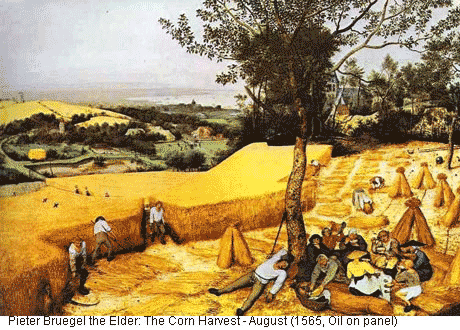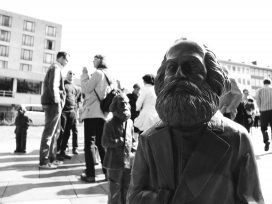The financial crisis and its economic consequences – failing banks, the slow-down in growth, the epidemic of redundancies – and ecological crisis – global warming and the destruction of biodiversity, of course have causes that are quite distinct from one another. And yet there are several factors linking these two processes. First and foremost, there is a tenuous thread that can only be expressed in the kind of language that is itself tenuous, the language, that is, of sentiment. In both cases, we are faced with the devastating effects of a certain form of abuse.
At the level of the speculative economy, one that is deregulated and totally divorced from labour, investment and the creation of value, this abuse takes symbolic form in the figure of the traders and their bonuses; in the bosses of companies that have been ruined or are threatened with ruin (involving mass redundancies), bosses who at the same time are rewarded with “golden parachutes”; and finally, in the banks, which having been rescued from ruin by state intervention have gone straight back to their old ways, to the practices that are acknowledged to have given rise to the financial crisis in the first place.
Such figures and such practices sever the link that the founding tenets of liberalism claimed to establish between personal enrichment and social benefit, between labour and the creation of economic value profitable to the whole of society. Playing the market breaks what a certain kind of economic liberalism considered a virtuous circle, just as extravagant levels of remuneration sever the link with any notion of merit.
In terms of ecology, abuse is expressed through a variety of symbols, in images that take the form of a “countdown”, of irretrievable waste, or of breathtaking contrast. In Yann Arthus-Bertrand’s environmental spectacular Home, for example, millions of cinemagoers watched the Arctic ice melting, the embodiment of the current process of destruction of our planet. Or there is the rapidly increasing deforestation of Indonesia caused by the cultivation of palm oil or rice, in 2007 resulting in huge forest-fires. There are the thousands of unsold and unwanted 4x4s in the US; there is the enthusiastic over-consumption by people in the northern hemisphere, which if extended to all the people of the world, would require several planets to satisfy; there is the urban overexpansion of “bubble-cities” built in the desert, like Dubai…
These are more or less obvious symbols, easy targets – and perhaps sometimes false targets. Yet they provide a focus for concern and for indignation. It should be noted that the most influential of those who have argued that unless we change our approach we risk destroying our planet have expressed their warning in terms of abuse. It will suffice here to quote Hans Jonas, where he identifies the tipping point at which our modern-day intention to “master and possess” nature, which until then had aimed – and to some extent still aims – at improving human life, risks becoming reversed and turning into the destruction of those very conditions that support human life: “The abuse of our dominance over nature leads to the destruction of that which we have learnt to dominate.”
At the point where the two processes intersect, this sense of abuse is directed at what Aristotle identified as two corrupt forms of chrematistics, that is, the “art of acquiring wealth”. The first concerns the straightforward acquisition of wealth for its own sake, without regard for the “welfare” of the community, obtained by all sorts of “dealing”. Since “they are incapable of obtaining [excessive enjoyment] through the normal processes of chrematistics”, writes Aristotle, “they attempt to achieve this by other methods” (Politics, I, 9, 1258 to 7-8), methods that he refers to elsewhere as “injustice” (II, 7, 1267 a 5). The second abuse lies in the creation of a wealth gap: “A rule that is common to democracies, oligarchies and any other form of constitution is that no citizen should be permitted to acquire a disproportionate share of power”, in particular “by increasing his wealth” (Politics, V, 8, 1308 b 10-12 and 19). Admittedly, Aristotle is here taking care not to advocate redistributing the property of the wealthy, but more importantly, preventing “the public purse” from contributing to gains made by the wealthy or by those who exercise public office.
But what is the point in recalling these ancient texts and economic dictates from a pre-capitalist, pre-industrial epoch? It is not, certainly, in the hope of finding in Aristotle principles of ethics for our modern-day economy, but rather to suggest that certain “essential” or fundamental perceptions, something resembling minimum principles of justice, underlie society’s views of the abuse inherent in any relatively endless acquisition of wealth.
Liberal theory, which claims that the unbridled pursuit of private interest “must” automatically and harmoniously combine with the common interest through the providential workings of the “laws of the market”, has tended to efface from economic theory any basic notion of “abuse”. The very basis of economics as a science is, we are told, the exclusion of any such ethical considerations.
Economic liberalism has thus managed to make its position impregnable: on the one hand, by means of a moral theory, determined by interest and a quasi-theology governing its own system of regulation; on the other, by claiming to be a science based on the exclusion of any morality not based on the premise that only private interest is rational. In fact, society’s view of abuse resists being ideologically negated by pure market theory, and likewise rejects the morality of interest that surreptitiously underlies it. In his conclusion to what remains one of the fundamental works on economic anthropology, the Essai sur le don (The Gift), Marcel Mauss pointed this out: “Our moral code is not simply that of the shopkeeper […] Nowadays ancient principles react against the rigours, abstractions and inhumanity of our codes […] and such a reaction against Roman or Saxon lack of sensibility is perfectly natural and powerful.”
“Roman or Saxon lack of sensibility” refers to the idea that social relationships are based solely on private interest, and that commercial exchange is the norm for any kind of contractual relationship. This kind of reduction or formalization, of which Roman law is a product, has served as a model for the most recent codes of civil law, especially when divorcing property rights from traditional or customary systems and from Christian economic ethics.
Mauss immediately goes on to make clear that “a whole area of evolving systems of laws and some of the most recent usages” go back to exploring such older ways of thinking with the aim of “adding other forms of law to the brutal law on selling and paying for services”. On one hand, Mauss cites forms of recognition of intellectual or artistic property rights that go beyond “true right”, that is rights over material things; on the other, he takes into account “all our social security legislation, that form of state socialism that has already been achieved”. (It is well-known that Mauss himself favoured a democratic and associationist form of socialism.)
What do they have in common, these novel forms of rights that respond to a narrow view of activity, of work produced and the protection afforded by the law? The answer is precisely a certain perception of those human and “temporal bonds” that exceed mere payment for the thing produced or for the work carried out (payment, for example, for a work of art or of literature, which Mauss calls “the brutal act constituted by the sale of a manuscript, or an original invention or work of art”). It is striking that Mauss’ two examples should be legal innovations produced in response to awareness of an abuse. In the first case, “The scandal of the appreciation in value of paintings, sculptures and objets d’art, during the lifetime of the artists and their immediate heirs, gave rise to a French law in September 1923 that awards the artist and his successors rights over successive appreciations in value in any subsequent sales.” Here there is an uncoupling of speculation in relation to the singular kind of creation of value that a work of art represents. As Arendt pointed out, such a work is different from utilitarian consumable objects, and so it reflects a durable anthropological dimension, a form of “stability” in human technical production “without which men could find in it no homeland”.
There is in Mauss’ examples a clear distinction between purely financial added value and original personal work that we already found to be at work in this notion of abuse. In the second case, concerning social laws, Mauss stresses that the principle that is operative in social security is the following: “The worker has given his life and his labour to the collective on the one hand and to his employers on the other […] those who have benefited from his services have not acquitted their debt to him simply by paying his wages.” Here, the feeling of abuse would lie in the idea of the worker being abandoned “after use”, if one may express it thus, as if participation in the creation of economic value were no more than momentary.
Abuse in property
Conversely, the desire to refuse to recognize any right that society might have to exert control over the manner in which wealth is acquired, or over the way ownership, including ownership of land, is exercised, is fundamental to the view of ownership that people tried to impose at the beginning of the nineteenth century, and that has left influential traces in our own civil law. The Napoleonic civil code defines ownership as “the right to enjoy and to dispose of things in a totally absolute fashion” (Article 544). Behind this definition, with its astonishing hyperbole (“a totally absolute fashion”), may be found a series of concepts that derive from Roman law: usus, fructus and abusus. An owner may be distinguished from an usufructuary because the latter’s rights are limited by the requirement that they should not diminish or damage the substance of the item, so that they may, at the end of the period of usufruct, return it to the owner, who shall have retained the right of abusus, that is, the right to sell, give or destroy the item. This set of concepts, deriving from Roman law, conceals remarkable speculative stakes when applied to the contemporary situation. Ownership, as such, is closely bound up with “abuse”, with the option of abuse being considered legitimate, with the right to destroy whatever property is owned. Here, destruction is an integral part of the concept of ownership, indeed its defining characteristic. I own that which I may destroy.
Admittedly, this article in the Civil Code immediately added the following clause to its statement on the rights of ownership: “Providing that none shall make use of it in a manner forbidden by law or by regulation.” Certain jurists at the time, such as the utilitarian Charles Comte, criticized the contradiction inherent in this clause: how could you announce “absoluteness” in freedom of use and then immediately restrict it by talking about legal or regulatory prohibition? However, this restriction was defended by most of his contemporaries. This restriction expresses the “universal passive obligation” by which all are bound, owners in particular, and which places the notion of private property in the context of its wider history.
Thus this definition certainly did have something paradoxical about it, especially when we recall that those who drew up the Civil Code were primarily thinking in terms of land ownership. Now, as an historian of rights of ownership points out,
As long as it is a matter of property that is consumed by use, and, a fortiori, by first use, such as a mouthful of water, a fish, a rabbit, the power to destroy is included in the power that the owner has at that moment; but as soon as we begin to consider land ownership, although we may easily grasp the need to add certain features to the right of ownership (right of succession, perpetuity, etc.), it becomes more and more difficult to maintain all those rights that go along with basic pre-emptive right.
In this area, indeed, state power was quick to accept that rights over land could not be absolute: you could take a book from your bookshelf and throw it on the fire if you wished, but setting fire to your lands, even without considering the danger to your neighbours, was another matter. The claim to absoluteness, to the “right to abuse”, as being in some sense an integral feature of ownership, is historically involved in the break (which might be termed “bourgeois”) with a non-exclusive view of ownership, defined instead by a range of “powers”. The medieval notion of seisin, as A.-M. Patault points out, allowed a “form of co-ownership, relating only to one or a number of uses, which puts all its co-owners on the same footing, whether they like it or not. Unlike the Roman notion of ownership, it does not confer abusus, the right to dispose of the material.” Such superimposition of uses could mean that, on the same piece of land, the fruit produced by the trees might go to one person, hay to another, the second crop to another; yet another person might even have the right to rest beneath the shade of an oak.
 Including abusus within the definition made it possible to break with any kind of “feudal” thinking that made the man who cultivated the land the liegeman or vassal of an overlord. Roman law is here used to affirm individual liberty, seen as the sovereign nature of a person and as a rejection of any of the various forms of patronage or paternalism that imply separating, at least partly, law and morality. But breaking away from a non-exclusivist concept of property also implied – or allowed – the destruction of communal use, of various kinds of usufruct of church property, that had been permitted under traditional laws more or less remote from the realities of usage. This enormous change in the history of rural ownership, happening at the same time as the “Romanization of law”, was most certainly, an ambivalent process, with liberation on the one hand (liberation of land and the right to dispose of it are seen as beneficiaries of the liberation of the individual from “bonds” that were traditional, ancestral, feudal, etc.), and expropriation, hiding behind this same affirmation of a new way of regarding private property, on the other. Adam Smith stressed the part played by progress in this process (reduction in dependency and feudal violence), whilst Marx pointed out its darker side.
Including abusus within the definition made it possible to break with any kind of “feudal” thinking that made the man who cultivated the land the liegeman or vassal of an overlord. Roman law is here used to affirm individual liberty, seen as the sovereign nature of a person and as a rejection of any of the various forms of patronage or paternalism that imply separating, at least partly, law and morality. But breaking away from a non-exclusivist concept of property also implied – or allowed – the destruction of communal use, of various kinds of usufruct of church property, that had been permitted under traditional laws more or less remote from the realities of usage. This enormous change in the history of rural ownership, happening at the same time as the “Romanization of law”, was most certainly, an ambivalent process, with liberation on the one hand (liberation of land and the right to dispose of it are seen as beneficiaries of the liberation of the individual from “bonds” that were traditional, ancestral, feudal, etc.), and expropriation, hiding behind this same affirmation of a new way of regarding private property, on the other. Adam Smith stressed the part played by progress in this process (reduction in dependency and feudal violence), whilst Marx pointed out its darker side.
Chapter 27 of Capital sets forth the process of expropriation of the rural population, which in England took a particularly brutal form. In fact, this process happens at the same time as the destruction of the traditional forms of usufruct: towards the end of the fourteenth century and even more so in the fifteenth, says Marx, “The vast majority of the population was made up of […] free peasants cultivating their own lands, regardless of the feudal obligations that were attached to their rights of ownership. […]. As for day labourers, “as well as their wages, they were given a concession of at least a four-acre field; […] in addition, along with the peasants in the strict sense of the term, they enjoyed the usufruct of communal property, where they could graze their cattle and provide themselves with wood, turf, etc. for heating.”
All such concessions, rights of usage and passage were progressively eradicated at the same time as the widespread practice of “enclosure”, that is, the fencing-off of fields, which was later to arrive in France in the eighteenth century. England was the testing-ground for the process of privatization of common property, of the privatization of despoilment that gradually came to be legalized. Although it was only later that it reached France, this process of abolition of common property and of usufruct was the contemporary background to Rousseau’s analysis of the origins and extent of inequality.
What is the point of raking over once again, in this summary fashion, the complex relationships between ownership and usufruct? It is simply in order to point out that the removal of the notion of abuse from the perspective of property rights, through its paradoxical inclusion in the definition of ownership itself, is a recent development. But it is also because this pair of Roman legal ideas, “abuse” and “usufruct”, might contain certain features that could enable us to arrive at a less unbalanced, less deregulated way of looking at our relationship with things, with wealth and with common property.
Usufruct: towards a different kind of political economy?
In the nineteenth century there appeared a variety of forms of resistance to what A.-M. Patault calls the “triumph of abusus” and of exclusivism, the assertion of an absolute right to use and to abuse property acquired, regardless of any concern for the common weal. The idea of usufruct, through broadening its semantic and practical horizons, could be placed in opposition to the assignment of absolute value to private interest alone. On the threshold of the twentieth century, a philosophical extension of this legal category was made by the solidarist thinker Léon Bourgeois in his book Solidarité:
It was for the benefit of all those called to life that those who have died created this capital of ideas, forces and aids. Consequently, it is for the sake of those who will come after us that we have inherited from our ancestors the responsibility for paying this debt […] Each generation that follows can truly consider itself to be a usufructuary of this inheritance: it only has the right to hold on to it on condition that it preserves it and faithfully passes it on.
According to Bourgeois, this “passing on” should not be taken to mean that the identical inheritance should be passed on, but rather that each generation should aim to make the legacy of previous generations bear fruit.
Naturally, for Bourgeois, this kind of intergenerational, diachronic solidarity also required that a synchronic form of solidarity become institutionalized. He drew up the theoretical and practical framework for this, for its public and governmental institutions that would support social institutions: friendly societies, associations, provident societies. He was thereby developing a notion that other spokesmen for solidarism, such as Bouglé, spoke of in theoretical terms as “social ownership”, or in the case of Duguit, as “public services”. Contrary to the “modernizing” rhetoric, which is often no more than a disguise for the proposed destruction of such public bodies, these were all things that solidarist thinkers had to justify by explicitly opposing what Bourgeois termed “the absolute freedom of competition” that allows the forces of wealth to abuse their power. As Robert Castel, who is at least in part a modern representative of this solidarist legacy, points out, both the thought and the actions of Bourgeois, Fouillée and Duguit were actually aimed at “making it possible for those who were not owners to be protected”, in particular by providing them with the benefit of services not paid for by private interests, “non-commercialized services accessible to all”.
In the passage of Solidarité that we quoted above, it can be seen that the question of future generations takes on a political value in relation to the adoption of this idea of usufruct. But the property that is held as usufruct is, according to Léon Bourgeois, essentially material civilization and culture, technical inventions and works, what he calls “the collective toolkit”. However, one can also find in Bourgeois, immediately after the 1914-1918 war, an awareness of unprecedented threats of “scientific barbarism” and “a new kind of destruction” – new, that is, in its scale, which would sow the seeds of an awareness of “interests” of a new kind: the interests of the planet itself seen as our “common homeland”.
One could, in fact, widen yet further the notion of usufruct to take account of and to combat abuses in the use of natural resources. In a sense, this is precisely what a certain kind of application of the economic notion of externalities attempts to do, namely to take account of aspects of economic life that the “orthodox” calculation of profit and loss leaves in the shadows. Thus, for example, if a company exploits resources that go unrecognized or that have become rare, such as clean river water, and this company does not take into account the pollution caused by its use of these resources and the cost of renewing them, it is able to benefit from externalities in the same sort of way as the bee and the beekeeper benefit from the flowers in neighbouring fields.
The externalities that nature provides for economic activity, insofar as nature remains outside the market-place, have long been the “empty square” in the capitalist economy, or rather, in the industrial economy as such (the USSR did not lag behind when it came to extreme exploitation of natural resources). Political aspects of ecology mean that this empty square has to be considered, and this should be the stimulus for a radical rethinking of economics in general. “Blind” economic growth not only has a cost, but also destroys the conditions for its own development and for life itself. In the long term, abuse renders use impossible. But narrow thinking in economic terms means being content with merely widening the scope of accounting to include values that were not hitherto taken into account, and to treat as resources things that are much more than that, things that are actually necessary conditions for existence.
Although similarly limited, another promising approach in contemporary economic thinking, one that breaks with the headlong onward rush of generalized abuse, is the economics of functionality. Its guiding principle is to change the focus of commercial relationships by selling not a product, but the use of a product, or by substituting for the sale of an item of property itself the sale of the use of that item. Admittedly, one might argue that purchasing the use of a thing and not the thing itself has a long history (in the field of transport, for example, you buy a train journey, not the train itself!). But the question is actually how far this model might be extended to “desubstantialize” the object sold, and to lay the stress on its “service” aspect.
As we know, companies have already moved in this direction by no longer selling photocopiers but by leasing the “services” of their photocopiers, installed on the user’s premises, and by demanding payment for their use. Economic and ecological interests can be seen to merge here: the user of the photocopier (usually a group, a research laboratory, or a business), because they are paying for the use of the equipment, will be motivated to use it as sparingly as possible, whereas the purchase of the photocopier itself might lead them to use it without restraint. Conversely, it is no longer in the interests of the manufacturer to design products that wear out quickly in the hope that the consumer will buy a replacement. The contrary is the case: it is in the manufacturer’s interest to supply equipment that is durable. Those who promote the spread of this economy of functionality point to its ability, in the long term, to reduce the use of raw materials and the emission of pollutants.
Dominique Bourg and Nicolas Buclet point out that the main idea is that a company that provides a benefit for its customers, a benefit of which it remains the proprietor throughout its life-cycle, behaves very differently from a company that, after the product has been sold, ceases to be interested in what happens to it, except for any hazards or health risks attached to its use to which customers might be exposed. But the company that leases the use of the product knows that the product will return to them when it ceases to be used, and this will encourage the company to include, at design stage, controls on waste management that it will sooner or later require.
There is a form of usufruct at work here: the manufacturer will not cease to take interest in what happens to his product once it is sold, and the consumer is motivated to use it in a controlled fashion. The use horizon is not “the right to dispose in a totally absolute fashion” of the item in question; it now includes the concern to minimize, in the long term, the harmful effects of its use.
Might one also imagine that a certain kind of extension of the idea of usufruct might be an answer, not just to the sense of ecological abuse, but also to the first sense of abuse that we mentioned? In the face of the irresponsibility of the speculative economy, of the award of payments to managers that are out of all reasonable proportion to the success or failure of a business, and even sometimes in inverse proportion to their concern for preserving employment? In the face of the “nationalization of banking losses” by means of massive public subsidy, immediately followed by maximum privatization of profits (by awarding millions of euros or dollars in bonuses to the managers or traders of the banks concerned)? Reprimands from political powers seem to be no more than marginal in such cases, even when they manage to bring about some reduction in the astronomical sums involved.
If we were to apply a more restrictive system based on this (metaphorical) extension of the idea of usufruct, what would it involve? It seems that two possibilities could be explored. The first would be to have the law assert a principle of internal solidarity within companies that would outlaw any disproportionate differences in remuneration between managers and employees of companies in receipt of state support. The second would be to stress the fact that certain sectors and certain players in economic life have special social obligations arising from the fact that their activity is a condition of economic life and of the life of society in the modern market economy. One example was provided at the time of the New Deal by the Glass-Steagall Act, which established the incompatibility of retail and investment banking, creating a federal system for insuring bank deposits, introducing a ceiling for the interest rate on such deposits. One can speak of an extension of the notion of usufruct in this case, in the sense that retail banks discovered that they no longer had the right to risk these funds in speculative investments (a practice that produced the spectacular crashes that we know about and the release of considerable public funds to prevent the collapse of national economies). A certain requirement to restore “intact” the funds deposited constituted an obligation upon retail banks, enforced by the law (therefore more effective than the “ethical” warnings from political powers), to assume their social responsibilities.
What do these various directions in political economics have in common? Restoring the bonds between the supplier of goods-as-services and their “users”, in other words, going beyond the limited sales relationship and involving a two-way relationship. This would stem from a requirement for use that, rather than meaning unbridled exploitation of resources, is characterized by an awareness of the fragility of what one is using, and of the limits of what “possession” – always relative – allows one to do. Such policies on use are all focused on a certain attenuation of domination, both in the sense of domination over the planet and of social domination; of ecological abuse and the excessive rights that those in a dominant position seize for themselves when public systems for regulating economic inequities break down.
These brief notes and speculations about pathways that might be followed were intended to do nothing more than avoid the premature end to the political, ethical, and even spiritual approaches that the current crisis in financial capitalism and ecology might lead us to explore. They are aimed at revising our conception of “growth at any price”, production for its own sake, and the acquisition of wealth as the yardstick for everything.
Regardless of any kind of political programme, it could be seen as an expression of concern (cosmopolitan in every sense of the term) for the way that the world is to be used; a concern to promote social and economic practices that can make use of the world without abusing it; a concern to find an answer to the sense of abuse that is so deeply rooted in us; a concern that responds to the twin spectacle of the breathtaking inequalities that divide our modern world, and the destruction of all that still makes it habitable, a place in which, in common, we may live and breathe.

 Including abusus within the definition made it possible to break with any kind of “feudal” thinking that made the man who cultivated the land the liegeman or vassal of an overlord. Roman law is here used to affirm individual liberty, seen as the sovereign nature of a person and as a rejection of any of the various forms of patronage or paternalism that imply separating, at least partly, law and morality. But breaking away from a non-exclusivist concept of property also implied – or allowed – the destruction of communal use, of various kinds of usufruct of church property, that had been permitted under traditional laws more or less remote from the realities of usage. This enormous change in the history of rural ownership, happening at the same time as the “Romanization of law”, was most certainly, an ambivalent process, with liberation on the one hand (liberation of land and the right to dispose of it are seen as beneficiaries of the liberation of the individual from “bonds” that were traditional, ancestral, feudal, etc.), and expropriation, hiding behind this same affirmation of a new way of regarding private property, on the other. Adam Smith stressed the part played by progress in this process (reduction in dependency and feudal violence
Including abusus within the definition made it possible to break with any kind of “feudal” thinking that made the man who cultivated the land the liegeman or vassal of an overlord. Roman law is here used to affirm individual liberty, seen as the sovereign nature of a person and as a rejection of any of the various forms of patronage or paternalism that imply separating, at least partly, law and morality. But breaking away from a non-exclusivist concept of property also implied – or allowed – the destruction of communal use, of various kinds of usufruct of church property, that had been permitted under traditional laws more or less remote from the realities of usage. This enormous change in the history of rural ownership, happening at the same time as the “Romanization of law”, was most certainly, an ambivalent process, with liberation on the one hand (liberation of land and the right to dispose of it are seen as beneficiaries of the liberation of the individual from “bonds” that were traditional, ancestral, feudal, etc.), and expropriation, hiding behind this same affirmation of a new way of regarding private property, on the other. Adam Smith stressed the part played by progress in this process (reduction in dependency and feudal violence




